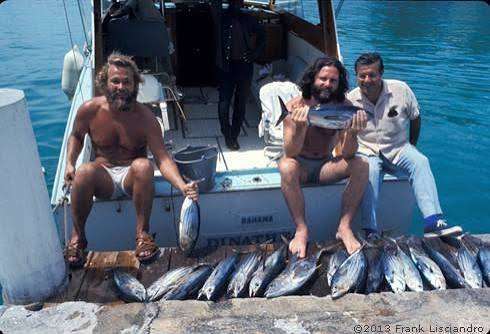
When people think of Jim Morrison, the legendary frontman of The Doors, the image that usually comes to mind is one of chaos and charisma — the leather-clad poet prowling the stage, spitting out verses like incantations, or the restless wanderer drifting through smoky bars and late-night streets in search of inspiration. His life, short as it was, seemed like a storm. Yet hidden within that storm were rare flashes of calm. One such instance, often overlooked in the mythology of Morrison, was the time he found solace in an unlikely place: a quiet fishing trip.
For Morrison, fishing was more than a pastime; it was a brief escape from the relentless noise of fame. The late 1960s had placed him under an unforgiving spotlight. Every lyric was analyzed, every performance scrutinized, every stumble reported. Even for a man who thrived on pushing boundaries, the intensity of public life could be suffocating. Fishing gave Morrison something the stage never could — silence.

This contrast between the Lizard King and the quiet fisherman is striking, but in many ways, it makes perfect sense. Morrison was a poet at heart, and fishing, with its long silences and moments of reflection, mirrored the process of writing. Casting a line into the unknown wasn’t all that different from casting words onto a page — sometimes nothing came, sometimes a spark, and sometimes, a revelation.
Morrison often carried a notebook, even on such outings, and observers noted he would scribble down lines while waiting for a bite. These notes weren’t always polished lyrics; sometimes they were fragments of thought, snippets of imagery inspired by the way the sunlight danced on the water or how ripples broke apart and reformed. Fishing wasn’t just an escape — it was fuel for his restless creativity.
He once described the kind of music he most enjoyed performing live as “these free, long blues trips where there’s no specific beginning or end. It just gets into a groove.” In many ways, fishing worked the same way for him. There was no strict structure, no predictable outcome. Just an open rhythm, a space where time could stretch endlessly, and where Morrison could let himself drift without boundaries.
But fishing also represented something deeper. For a man who often tested the limits of existence — through art, through intoxication, through rebellion — the act of fishing was almost meditative. It required slowing down, embracing patience, and letting go of control, three things Morrison often resisted in his everyday life. The water asked nothing of him but presence. For once, he could simply be Jim, not Jim Morrison the rock icon.
Whether he actually caught much is beside the point. For Morrison, fishing wasn’t about the fish but about the pause — a rare break in a life that otherwise seemed like it was always running toward the edge. The river or lake became a sanctuary, not unlike the stage, but one where he performed only for himself.
In hindsight, Morrison’s fishing trip feels symbolic of his constant search for balance. The same man who wrote about breaking through to the other side and confronting the mysteries of existence also sought peace in the most ordinary of human activities. It was a reminder that beneath the myth of the Lizard King was a man trying to find stillness in a world that demanded motion.
Jim Morrison’s life ended far too soon at the age of 27, leaving behind a legacy of music, poetry, and myth. Yet, stories like his fishing escape remind us of the human being beneath the legend. For one afternoon, the man who roared through microphones and defied conventions sat quietly with a fishing rod in his hand, content to let the water keep its secrets.
Leave a Reply